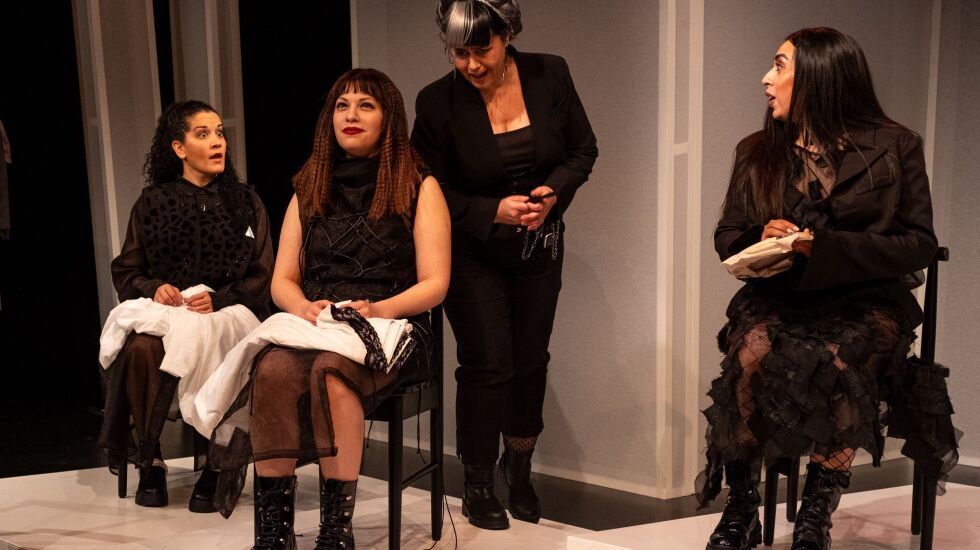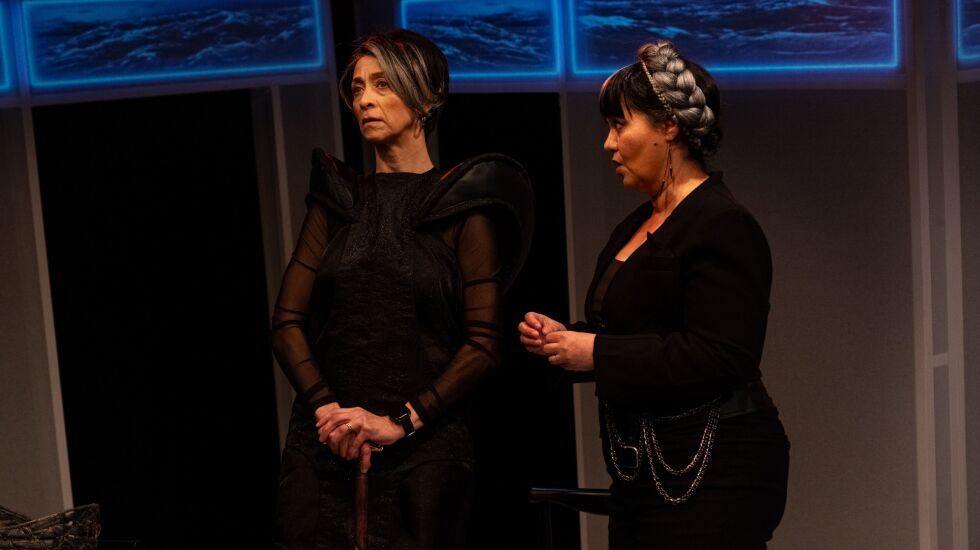
As a child, the story goes, Federico García Lorca would visit family in the south of Spain. He would sneak into a dry well that used to be shared with the neighbors, the Albas. He could hear the private conversations of the reclusive, mysterious family, whose widowed matriarch kept an iron rule over her daughters.
Garcia Lorca later used this as the inspiration for one of his most famous plays, “The House of Bernarda Alba,” which he finished just weeks before he was killed in 1936 at 38. His slaughter almost certainly was carried out by the fascist forces of the burgeoning Spanish Civil War, who despised his left-leaning politics and his reputed homosexuality.
Sexuality and societal oppression form the competing drives that lead inexorably toward tragedy in “The House of Bernarda Alba,” which has been adapted — and billed as a new work with the abbreviated, and exclamatory, title “¡Bernarda!” — by Emilio Williams. Directed by Wendy Mateo, it’s being presented by the Latino theater company Teatro Vista in cooperation with Steppenwolf Theatre at the latter’s intimate 1700 space.
Obsessed with reputation above all and fully bought in to the subservience of women to men, Bernarda Alba (Charin Álvarez) insists that her daughters will stay in mourning for her newly deceased husband for years, basically as prisoners in their own home.
The only possible escape belongs to the eldest daughter Angustias (Claudia Quesada), who inherited money from her father, Bernarda’s first husband, and is therefore being courted by the town’s most handsome bachelor, who stays offstage in one of few classic plays where no man appears.
The potential marriage becomes a catalyst for rising tension among the sisters, the youngest, Adela (Alix Rhode), who has desires way beyond her ability to contain them. It’s certain that, unless something gives, she’ll end up like her grandmother Maria Josefa (Álvarez again), who is locked away in a room in the house so the neighbors can’t hear her ranting about wanting to marry.

The primary quality of Williams’ adaptation is a reduction to the most dramatic scenes in a play that Garcia Lorca filled out with atmospheric sequences. Rather than a slow simmer gradually leading to an explosion, this version reaches a full boil early and then keeps going. Under Mateo’s direction, the focus is on Adela’s openly rebellious resistance to the oppression, rather than on the battle between internal and external forces.
Garcia Lorca’s plays always contained an interesting contradiction. In his later works, he was interested in depicting a social realism and critiquing it. He also expressed an aspiration towards a “total” theater, a sensual theater in which poetry, song and visuals combined. So there’s room for artists to be bold in exploring Garcia Lorca’s theatricality, particularly as the copyrights expire, giving more freedom to alter the original.

There are elements of significant imagination here, particularly with Sarah Albrecht’s costumes — some varied and fascinating work with black — and the combination of Lauren Nichols’ set design with Erin Pleake’s projections. The projections suggest a spy state in which Bernarda keeps an eye on everything, including a camera on her mother, endlessly circling in her room.
But it’s not that Bernarda knows everything that’s going on — she doesn’t, and she won’t listen to her servant Poncia (Stephanie Diaz), who tries to tell her. Instead, she lives in a constant state of paranoia that the whole world — meaning everyone in her insular village — is watching and judging her.
What the production lacks in nuance and suspense, it largely makes up for with intensity. Alvarez is excellent as two characters who could not be more antithetical, representing the embodiment of oppression and its opposite, the superego and the id, if you will.
I also found highly compelling the performance of Ayssette Muñoz as Martirio. If Angustias is obedience (because it serves her), and Adela is sexualized resistance, in Muñoz’s Martirio we see a swirl of confusing emotions, making her the most relatable of the lot.
During the sequence in which Martirio makes two fateful decisions that lead to the climax, my eye was drawn to the projection of the well, imagining a young boy listening in. Decades later, he’d combine elements of an experienced reality with the craftsmanship and imagination of a dramatic artist of the highest order.







